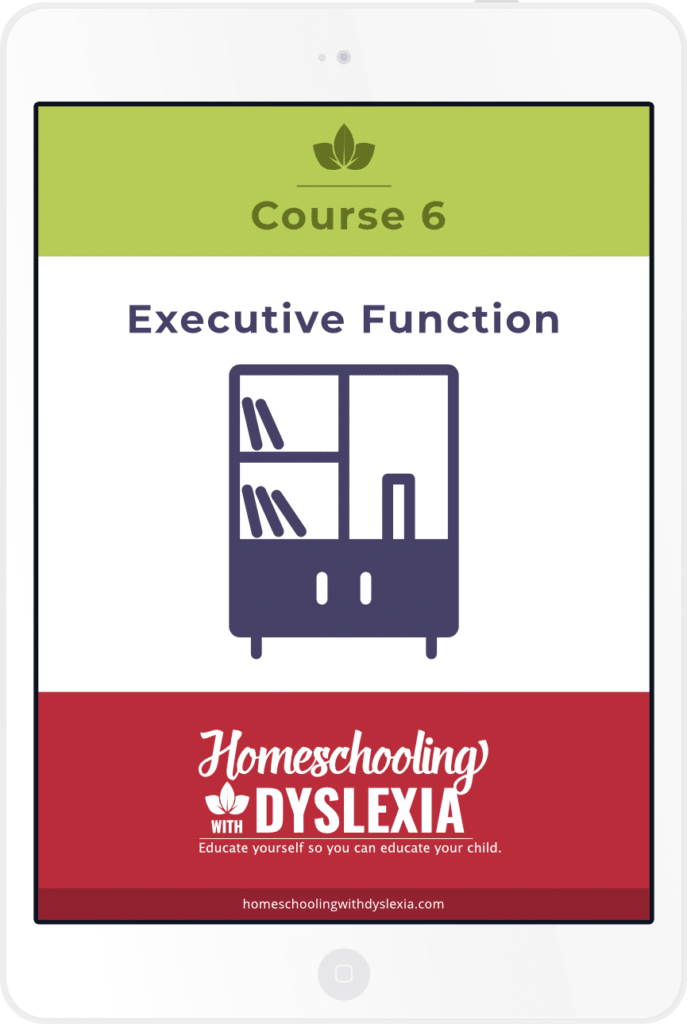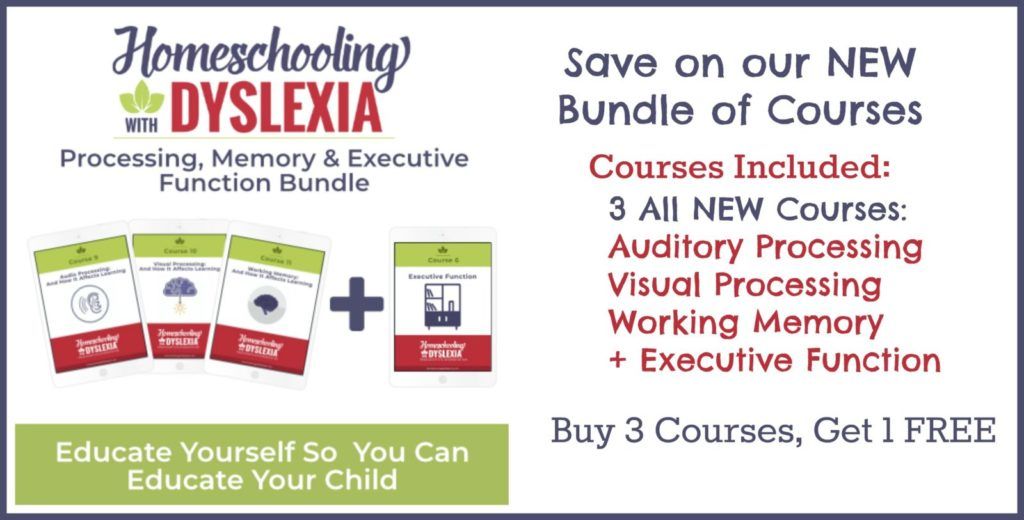Successfully homeschooling a child with inattentive ADHD isn’t always easy but the freedom and flexibility to them in the way they learn is of such benefit, it is worth the struggle.
Today’s Mailbox Monday question has to do with just that:
“Do you have any experience with inattentive ADHD and executive function struggles? If so, any advice for homeschooling?”

Of our seven kids with dyslexia, six of them have some form of inattention. I’ll describe the types of inattention in a minute. Not understanding what inattention, or executive function weakness, meant and how it was playing out in our day-to-day lives had a huge impact on my adult kids’ lives. I am passionate about sharing honest, reliable, reality-based information about these issues so that you can understand and help your child in the best ways possible.
Understanding Executive Function and ADHD
Inattention, ADHD, and ADD all fall under the skills affected by the executive functioning areas of the brain. Executive function affects our ability to:
- Plan
- Organize
- Prioritize
- Resist distractions
- Think flexibly
- Keep track of details
- Complete tasks
- Learn from the past
- Delay gratification
- Regulate emotions
You can see from this list that a student who lacks executive function skills is going to have a hard time in a school setting. Sometimes, when these kids are doing something they love, they are able to function pretty well. But the skills do not transfer over to activities that they find boring, difficult, or overwhelming (or where the gratification is delayed).
You can learn more about Executive Function Weaknesses in this post.
There is no cure for ADHD but skills can be taught. Executive functioning skills continue to develop into our 20s and it is important to teach and model these skills to our kids.
What Inattentive ADHD Looks Like
These are the things you may be seeing day-to-day with your child:
- doesn’t pay attention to details
- makes careless mistakes
- trouble staying focused; is easily distracted
- appears not to listen
- difficulty remembering things and following directions
- trouble staying organized, planning ahead, and finishing projects
- gets bored with a task before it’s completed
- frequently loses or misplaces schoolwork, books, toys, or other items
- resistance to school
- messy room, desk, or backpack
- unmotivated
It’s important to note that not all kids with inattention have the hyperactivity component. For many years I missed my older kids’ inattentive ADHD because I didn’t understand this.
Signs of ADHD with Hyperactivity
ADHD is much more recognizable probably because the behavior is often annoying and disruptive!
- constantly fidgets and squirms
- runs or climbs inappropriately
- talks too much
- difficulty playing quietly or relaxing
- always on the go – as if driven by a motor
- may have a quick temper
- acts without thinking
- blurts out words without hearing the whole question
- trouble waiting for their turn
- often interrupts
- trouble keeping strong emotions in check – angry or emotional outbursts
- guesses rather than taking time to solve a problem
How to Support the Child with Inattentive ADHD
Supporting a child with inattentive ADHD is pretty much the same as supporting a child with hyperactivity.
Understand Your Child
It really is true that our kids want to do well. They want to please us. Kids with ADHD do not have the ability to stop and think through the consequences of their actions. Instead, they act on their emotional impulses and get stuck repeating dysfunctional routines and self-defeating habits. Not because they don’t care, not because they are willful or defiant, but because they do not have the skills.
I know from my experience that it is common to ‘remind’ our kids of what they are supposed to be doing all.day.long, a.k.a. nagging. Am I right? I mean, I need to get stuff done and it’s my normal go-to to get my stragglers moving. Unfortunately, this often results in kids feeling like they are deficient or that we don’t like them. Ask me how I know!
Equip Your Child
Our goal is to equip our kids with the skills to motivate and organize themselves. Unfortunately, nagging doesn’t usually achieve that. The best thing I have done with my disorganized, distracted kids is to work on one area at a time to build a habit of organization.
Setting up Systems
For example, room cleaning. Most kids, but not all, will have a lot of trouble keeping their spaces clean. Early on we made sure that there was a place for everything. Sports gear had a box. School books had a place on the desk. Clothing, toys, and books all had a place. Every day we have a cleanup time in our home. During this time, our kids put everything where it belongs. If there is no room for it, it needs to find a place or go. Clutter is very distracting for kids with EF weakness.
Work with your kids regularly on this skill until it has become a habit.
Most skills will need to be taught. Room cleaning can be overwhelming because our kids don’t know where to start or what to prioritize. Using the I Do – We Do – You Do Method is a great way to teach kids how to complete a task.
The first few times, you clean a room, Mom or Dad does it, explaining what they are doing and why along the way. Then, do the cleaning together, guiding your child to your organization methods. Finally, your child can clean up and you can only step in if needed. This I Do- We Do- You Do Method works great for many things.
Remember, your kids need your guidance and compassion.
Other systems we use are written schedules, checklists, daily routines, etc.
You can learn more about strategies or systems that help support kids with Executive Function weaknesses in my parent course:

Executive Function: Teaching Your Child to Organize Their Thoughts, Personal Space and Time
In this class, you will learn:
- what executive function is and how it develops
- signs of executive function weakness
- myths about kids (and adults) with executive function weakness
- how executive function weaknesses can affect learning and academics, behavior and emotions, and social skills and relationships
- targeted strategies to help kids learn to organize their time, thoughts, and belongings
- strategies to help kids learn to prioritize tasks
- strategies to help kids learn how to manage their time management
- strategies to help kids learn self-control
- and strategies to help kids develop better social skills
You can pay an executive function coach to teach these things to your kids or you can learn to teach them yourself!
Get Their Feedback
Yulia Rafailova, Executive Function Coach at MindfullEducation.com says that instead of nagging, reminding, or creating a schedule for your disorganized child, take the time to sit with them and ask them what their goals are and how they might reach them. Have them create a plan and work that plan (even if YOU think it won’t work).
Hold them accountable to this plan and revisit the conversation after the plan is complete. What worked? What didn’t? How do they think they can change their plan for the next time? This strategizing with your child, helps them develop the flexible thinking and organization skills they need. It will take more time but will serve everyone better in the long run.
Lead by Example
By taking the lead and modeling behaviors we want our kids to emulate, research shows that when your child observes your behavior, they will mirror your behavior which is another way they develop habits over time. This co-regulation with an adult who has functional and healthy habits is one of the biggest keys in helping your child develop their ability to regulate their own emotions and habits.
This means:
- taking a deep breath and resisting the urge to join the fray when emotions are out of control.
- thinking flexibly when struggles come up
- calmly setting limits for unacceptable behavior
- ask questions instead of lecturing
- look at problems as a way to learn
- ask your child to think of solutions that would work
- foster your relationship by finding time to do things you like to do together
- tell them you believe in them
- praise their effort to do what is expected
SO much of parenting kids with learning and attention struggles is understanding what is going on behind the scenes, having compassion toward them, and working together to find solutions.
Another great resource that I have created to help you on this journey is the Processing, Memory, and Executive Function bundle of courses. Learn more about Auditory Processing, Visual Processing, Working Memory, and Executive Function.

What strategies have you used with your inattentive child? Share in the comments!





I think the strategies you site to help cultivate executive functioning skills is necessary. However, as a parent of children who struggle with ADHD, I have found that balancing brain chemicals is imperative and definitely a game changer. Once brain chemicals are balanced with medication, the children (and adults) are supported in their efforts to work toward their goals diligently. Medication should never “shut down” a person. The type and dosage should give the person the relief they need to carry out their tasks and be who they are. I find that medication and executive functioning skills are a dynamic combination. Children with learning disabilities need these supports. Balanced brain chemicals facilitate the peace of mind needed to function. Confidence and joy for living build!
Thank you for sharing Asela. I do believe that medication to balance brain chemicals can be an excellent solution. Many people fear the long term effects of ADHD medications but the long term effects of not taking them can be worse.
You both are completely right! Stimulants are the longest prescribed class of medications. Long term effects of stimulants are usually fear based and they can be quite safe. It’s kinda like not giving your child glasses when they can’t see very well and just tell them to squint harder. Yes, the decision to give glasses vs medication isn’t quite the same analogy. I understand giving our kids meds is a huge decision and not to be made lightly.